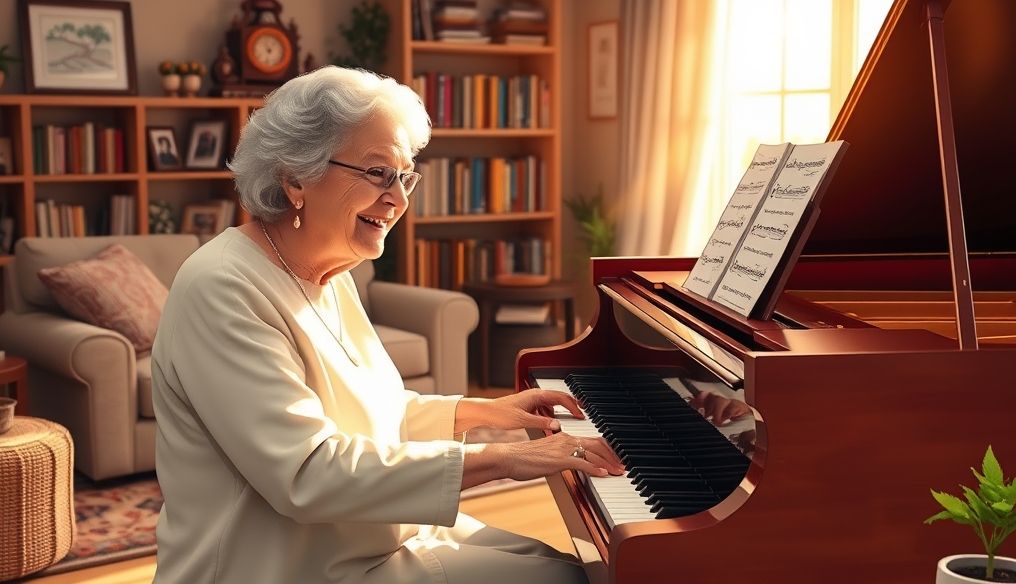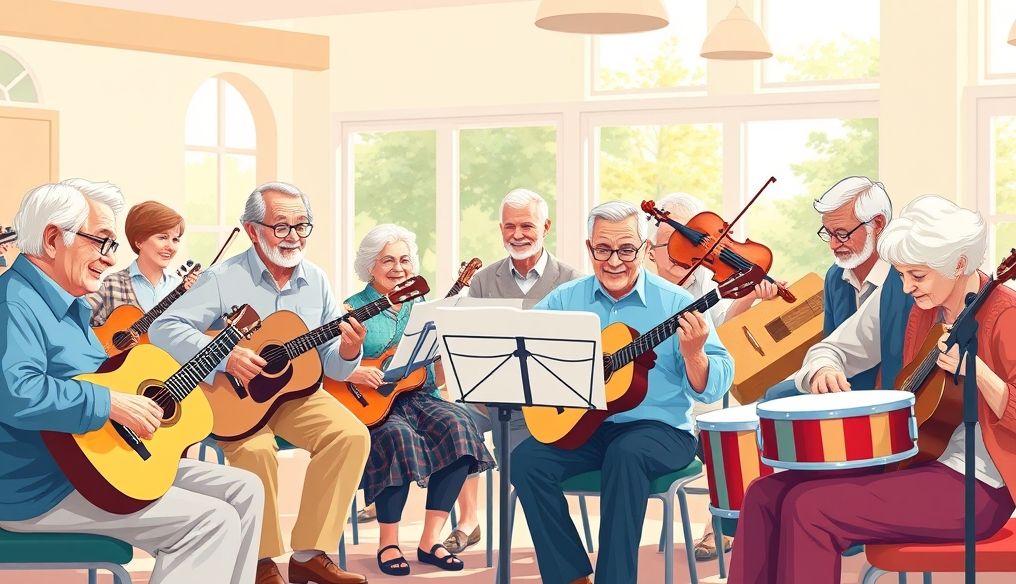Is it Possible to Learn to Play a Musical Instrument at an Older Age?
Many people believe that learning to play a musical instrument is a privilege reserved for children or young adults. But, is this belief correct? Can someone in middle age or even older learn to play the piano, guitar, or any other instrument? The answer is a resounding yes! In fact, there are many benefits to learning music later in life.
1. Science Confirms: The Brain is Flexible and Adaptable
Modern research has shown that the human brain possesses significant flexibility and adaptability, even in advanced stages of life. This neuroplasticity means that the brain can form new neural connections, strengthen existing ones, and even reorganize itself in response to new experiences. Learning to play a musical instrument is a new and stimulating experience for the brain, helping to foster this flexibility.
2. Benefits of Learning Music for Seniors
Learning to play a musical instrument at an older age is not just about enjoyment and personal fulfillment; it also has numerous health and mental benefits:
- Improved Memory: Playing a musical instrument requires remembering notes, rhythms, and harmonies, which helps strengthen short-term and long-term memory.
- Enhanced Focus and Attention: Playing requires high concentration and coordination between the hands and eyes, improving the ability to focus and pay attention.
- Stress and Anxiety Relief: Music has a calming and relaxing effect on the body and mind, helping to relieve stress and anxiety.
- Improved Motor Skills: Playing requires the precise use of hand and finger muscles, improving fine motor skills.
- Boosted Self-Confidence: Achieving progress in playing an instrument boosts self-confidence and a sense of accomplishment.
- Social Interaction: Joining a band or ensemble provides opportunities for social interaction and making new friends.
3. Challenges of Learning Music Later in Life and How to Overcome Them
Of course, learning to play a musical instrument at an older age may present some challenges, but they can be overcome with patience and perseverance:
- Time: Finding enough time to practice can be challenging, especially with family and professional commitments. The solution is to dedicate specific time to practice each day, even if it's short.
- Physical Flexibility: Some may experience stiff joints or hand problems. The solution is to practice warm-up and stretching exercises before playing, and consult a doctor or physical therapist if necessary.
- Patience: Progress may be slower compared to children or young adults. The solution is to be patient and persistent, and focus on enjoying the process rather than focusing on results.
- Fear of Failure: Some may feel fear of failure or judgment from others. The solution is to remember that learning is a personal journey, and mistakes are a natural part of the process.
4. Tips for Beginners Learning Music at an Older Age
Here are some tips that may help you on your journey to learning to play a musical instrument:
- Choose the Instrument You Love: Choose the instrument that interests and inspires you, as this will make learning more enjoyable and exciting.
- Find a Good Teacher: A good teacher can provide you with the necessary guidance and support, and help you avoid common mistakes.
- Start Slowly: Don't try to learn too much in a short amount of time. Start with the basics, and gradually increase as you progress.
- Practice Regularly: Regular practice is the key to success. Try to practice for at least 15-30 minutes each day.
- Enjoy the Process: Remember that learning should be fun. Don't put pressure on yourself, and enjoy the journey.
- Join a Musical Group: Playing with others can be a fun and rewarding experience, and help you improve your skills.
- Don't Compare Yourself to Others: Focus on your personal progress, and don't compare yourself to others. Everyone learns at a different pace.
5. Inspiring Stories of People Who Learned to Play Later in Life
There are many inspiring stories of people who learned to play a musical instrument later in life and achieved great success. For example, there are many people who started playing the piano in their 60s or 70s and became skilled pianists. These stories prove that age is not a barrier to achieving dreams.
6. Choosing the Right Instrument: A Comprehensive Guide
Choosing the right instrument is a crucial step in your musical journey. Here are some factors to consider:
- Personal Preferences: What instruments do you enjoy listening to? What instruments do you feel resonate with your personality?
- Budget: Musical instrument prices vary greatly. Set a budget before you start searching.
- Space: Some instruments require a lot of space, such as a piano or drums. Make sure you have enough space in your home.
- Difficulty: Some instruments are easier to learn than others. If you are a complete beginner, you may want to start with an easier instrument.
- Health Conditions: If you have problems with your hands or joints, you may need to choose an instrument that does not require a lot of physical effort.
7. Available Learning Resources: From Teachers to Apps
There are many resources available for learning to play a musical instrument, including:
- Private Teachers: A private teacher can provide you with personalized guidance and support, and help you achieve your goals.
- Group Lessons: Group lessons are a cheaper option than private lessons, and provide an opportunity to connect with other learners.
- Online Courses: There are many online courses that offer lessons in playing various musical instruments.
- Apps: There are many apps that can help you learn to play a musical instrument, such as Yousician and Simply Piano.
- Books and Other Resources: There are many books and other resources available that can help you learn to play a musical instrument.
8. The Power of Music: Why You Should Start Today
Music is not just a hobby; it is a force capable of changing your life. Learning to play a musical instrument can bring you happiness, creativity, and social connection. Don't let age stand in your way. Start today, and discover the joy of playing!
In conclusion, learning to play a musical instrument at an older age is not only possible, but also beneficial. With patience, perseverance, and the right resources, you can achieve your musical dream, no matter your age. So, don't hesitate, start today, and discover the joy of playing!




